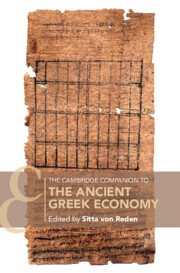Book contents
- The Cambridge Companion to the Ancient Greek Economy
- The Cambridge Companion to the Ancient Greek Economy
- Copyright page
- Contents
- Maps
- Notes on the Contributors
- Abbreviations
- Maps
- 1 Introduction
- Part I Diachronic Perspectives
- 2 Early Iron Age Economies
- 3 The Archaic Period
- 4 The Classical Period
- 5 Hellenistic Economies
- Part II Regional Perspectives
- Part III Structures and Processes
- Part IV Networks
- Part V Performance
- References
- Index
- Cambridge Companions to the Ancient World
3 - The Archaic Period
from Part I - Diachronic Perspectives
Published online by Cambridge University Press: 21 July 2022
- The Cambridge Companion to the Ancient Greek Economy
- The Cambridge Companion to the Ancient Greek Economy
- Copyright page
- Contents
- Maps
- Notes on the Contributors
- Abbreviations
- Maps
- 1 Introduction
- Part I Diachronic Perspectives
- 2 Early Iron Age Economies
- 3 The Archaic Period
- 4 The Classical Period
- 5 Hellenistic Economies
- Part II Regional Perspectives
- Part III Structures and Processes
- Part IV Networks
- Part V Performance
- References
- Index
- Cambridge Companions to the Ancient World
Summary
The Greek world from ca. 750 onwards saw the establishment of wealthy elites, the widespread use of chattel and other slaves, and the occupation of new territories across the Mediterranean, all of which laid the groundwork for later developments. Elite property owners exploited the labour of the free poor, thereby adding to their own surpluses while keeping levels of consumption in the wider community minimal and archaeologically invisible. Only when and where social unrest or outright civil war led to restrictions on exploitation, and when new trading opportunities emerged around 600, did a middling class begin to establish itself, and to create demand for a range of staples that they could not produce themselves. In the late sixth century, the economic and social structure of the classical Greek world took shape, as regional and local specialisation and trade networks reached a level that enabled significant – if unquantifiable – per capita growth. Not all parts of the Greek world shared equally in these developments. Sparta, Crete, and Thessaly retained a polarised social structure of leisured elite and slave workers and continued to aim at agricultural self-sufficiency, institutionalising key features of the old predatory regimes that other Greeks were leaving behind.
Keywords
- Type
- Chapter
- Information
- The Cambridge Companion to the Ancient Greek Economy , pp. 29 - 48Publisher: Cambridge University PressPrint publication year: 2022
- 1
- Cited by

